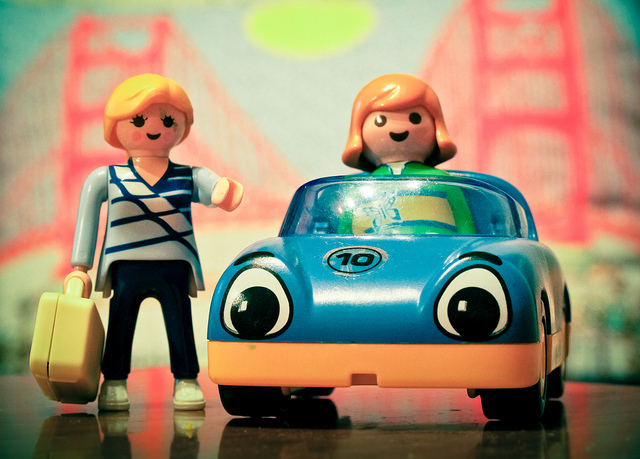Vacation time is (in our opinion) one of the most important times of the year. It’s truly a chance to separate from the rat race and take stock of the things that really matter to you while also getting some all-important relaxation (or stimulation and adventure if that’s what you’re more in need of). Even if your vacation doesn’t involve eco-travel, we still think it’s vital to step back from everyday pressures and tasks and get out of your regular routine by experiencing a different place or location. But travel has been impacted by the ubiquitous presence of consumerism as much as any other segment of life. Today, we’re running down the consumer traps you’ll want to look out for when you’re planning your vacation.
Consumer Trap Number One: The Obvious Souvenir Industry
Sometimes starting with the obvious thing first is best, and in this case the most obvious thing is the one that actually involves “stuff.” We’re not going to be so cliché as to say that the value of a vacation is in the experience and you don’t need “stuff” to remember it by. In fact, we think quite the opposite – possibly because we’re getting older and we’re learning that memory can be more fleeting than you think! But there’s a difference between taking photos or buying a keepsake from a local artisan and raiding the t-shirt and knick knack store. Somewhere along the line in our society, buying “stuff” became an accepted and essential part of every trip. We’re not sure there’s a deeper example of how integrated consumerism is even with experience elements of our life. Stay strong, and follow our tips for buying socially and environmentally conscious souvenirs.
Consumer Trap Number Two: The All Inclusive Deal
All-inclusive vacation options are hugely popular, typically because they’re affordable and present the appearance that you’re getting a lot of value for a smaller or reduced amount of money. We’re going to (gently) remind you that nothing in life is free and if a deal sounds too good to be true then it probably is. While it’s true that you’re likely getting a reduced markup on things like food and beverages that allow you to feel like you’re getting more for your money, that profit margin is being made up elsewhere. The question is, where is it being made up? It takes a lot of research to figure out the answer to that. Chances are pretty high that either the staff or facilities are being underfunded or that you’re going to be exposed to a high number of “upsells” or “bonuses” once you hit the resort that are extremely marked up to make up the difference. There are actually a lot of reasons to avoid an all-inclusive resort, but the fact that it takes advantage of basic consumer assumptions is a good one.
Pro Tip: All-inclusives are one of the least eco-friendly vacation options. Make sure you know what the others are.
Consumer Trap Number Three: Speaking of Upsells…
Upsells and cross-sells are an essential part of retail marketing, and travel is basically commodity retail marketing. Whether you book your vacation through a travel agent or using an online travel planning and booking site, chances are high that as soon as you select a destination and a place to stay, you are immediately bombarded with suggestions for hotels you may like better, ways to upgrade your seats on the plane, activities to consider while on vacation and “discounts” if you also book a car or other activity. You may or may not find all of these “suggestions” as helpful as you would a recommended items suggestion when purchasing an item online. But whether you find them helpful or not, they are designed to do one thing, and that is to get you to buy more, more and more. And, much like the cross sells and upsells you’ll experience on retail websites, these suggestions are using a lot of data that was collected from you to decide what to show you to have the best chance at converting you to a sale. We say it all the time – try to stay blind to the on-page advertisements, and that includes cross-sells and upsells.
Consumer Trap Number Four: Activities and “Stuff” for Kids
Don’t read that headline and think that we don’t want your kids to enjoy their vacation too (if you have or are traveling with children). But marketers in tourist rich areas know that kids are a target-rich environment for making money off of parents who want to entertain their kids, children who will pressure their parents into purchasing activities and “stuff,” and even parents who just want to find a way to calm their kid down for an hour. This isn’t any different from the rest of the consumer world where marketers often target kids with fun cartoon advertising and then assume (correctly) that the children will be able to convince the adults (or in other words the actual credit card holders) to buy the items. Obviously, you’ll want to book activities for kids if you’re traveling with them. But be aware of the marketing machine that surrounds both activities and souvenirs (there’s a reason all souvenir shops carry stuffed animals, after all). Do some research and try to select activities and set schedules in advance so that you’re less likely to spend money on an activity or item designed to take advantage of the fact that you’re traveling with a child.
Did we miss a common consumer trap associated with travel that you want to share with us? If so, just tell us about it on one of the social media channels below.
Facebook | Twitter | Instagram | Tumblr | Pinterest | Google+
Photo Credit: Susana Fernandez via Flickr





